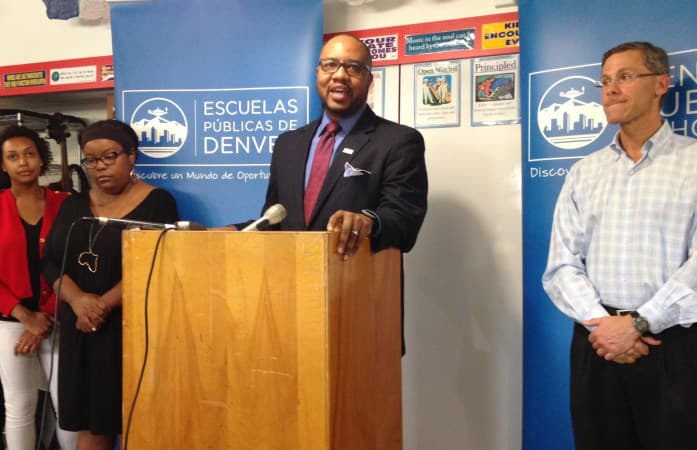
Originally posted on Chalkbeat by Melanie Asmar on October 3, 2016
Two months after a critical report detailed how black educators feel mistreated by Denver Public Schools — and feel the needs of African-American students are going unmet — school district officials Monday outlined in more detail a plan for how they will respond.
“The first thing we must do is we must acknowledge what was in the report,” said Allen Smith, the newly hired associate chief of DPS’s Culture, Equity and Leadership Team, who is spearheading the efforts. “We cannot run away from it. We cannot hide from it. It’s there.”
Speaking at a press conference at Columbine Elementary in northeast Denver, surrounded by African-American community leaders and district brass, he added: “We have to sit down and work together and grapple with tough conversations.”
While the district has been consulting with a small group of leaders, those conversations will broaden next month when a 25-person steering committee is set to meet for the first time. The committee will be tasked with recommending policy and procedure changes by the summer.
DPS commissioned the report “because we had been hearing about the challenges of our kids of color, our families of color, our educators of color,” school board president Anne Rowe said. About 14 percent of DPS students are black, while only 4 percent of teachers are.
The report’s author, former school board member and school integration scholar Sharon Bailey, interviewed 70 African-American teachers and administrators about their experiences.
Among her findings:
— Black educators said they feel isolated and unaccepted.
“African-Americans in DPS are invisible, silenced and dehumanized, especially if you are passionate, vocal and unapologetically black,” one educator told her. “We can’t even be advocates for our kids. It feels a lot like being on a plantation.”
— Black educators reported difficulties securing promotions.
“I don’t know what’s going on but African-American women are systematically being removed, looked over, passed up and stepped on,” an educator said.
— Black students are more harshly disciplined than white students — in part, the educators said, because young white female teachers seem afraid of them.
“These teachers just kick African-American males out of the classrooms,” an educator said.
— Black students are getting left behind because they get fewer resources than students learning English, many of whom are Spanish-speaking, the educators said.
“I don’t know exactly how to say this without sounding biased,” one educator said. “I think there have been a lot of things put in place for Spanish-speaking families and refugee families … All of those things are really powerful, but are only powerful for the people they serve.”
Rowe called the educators who were interviewed brave.
“What this report tells us is that while DPS is committed to students first, is committed to supporting educators, is committed to equity, is committed to diversity, we have a lot to do,” she said. “We have institutional racism. It exists. We have bias. This report wasn’t a surprise.”
Superintendent Tom Boasberg said that while the report was “very painful to read” at times, it also serves as “a sharp reminder of the work we have in front of us.”
“We are here first and foremost because of the civil rights mission of our schools and the possibility of our schools to create opportunity, remedy injustice and create social equity,” he said. “Unless and until we do it in our schools, we will not see it in our society.”
While district officials’ first instinct was to act immediately, Boasberg said, he and others recognize the importance of including the community — including parents, students and educators — in coming up with solutions.
In addition to the steering committee, the district plans to create five working groups to address areas of concern. For instance, Smith said, one group will examine the access black educators have to promotions and the access black students have to rigorous programs. More than 150 people have already applied to serve on the steering committee or the working groups, he said.
Smith hopes the recommendations will be finalized by May.
In the meantime, officials said the district will strengthen its efforts to recruit African-American teachers and continue to provide bias training to employees. DPS will also begin new initiatives, Smith said, including an educators of color speaker series that will draw experts from Colorado and around the country, and convening a team of black educators to advise the superintendent.
Chalkbeat is a nonprofit news site covering educational change in public schools.













